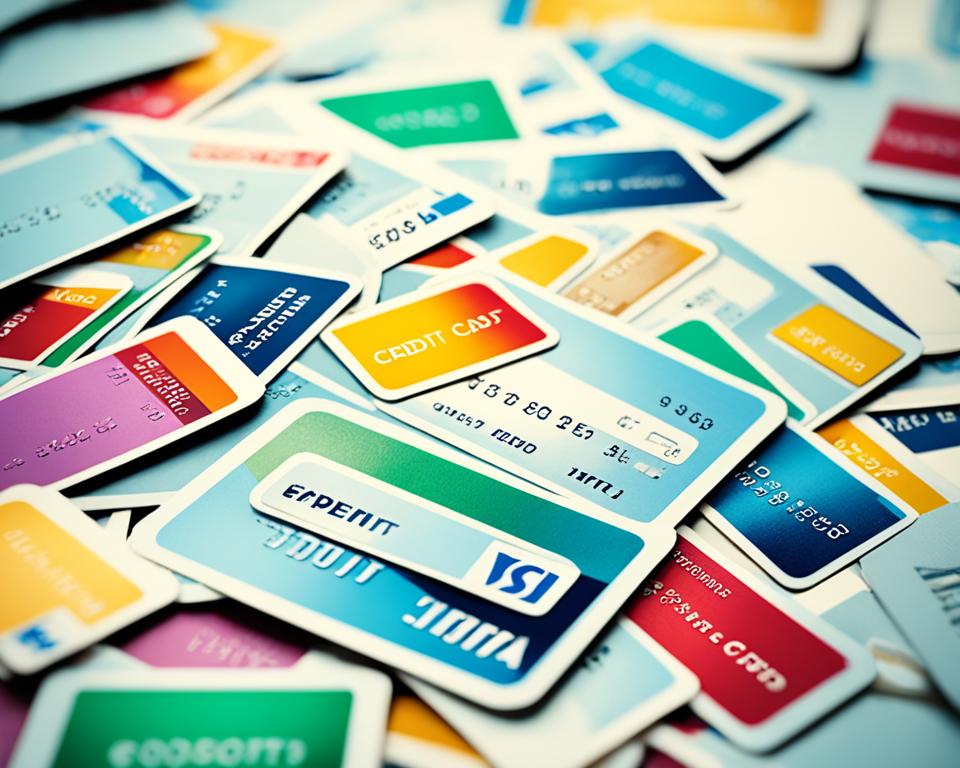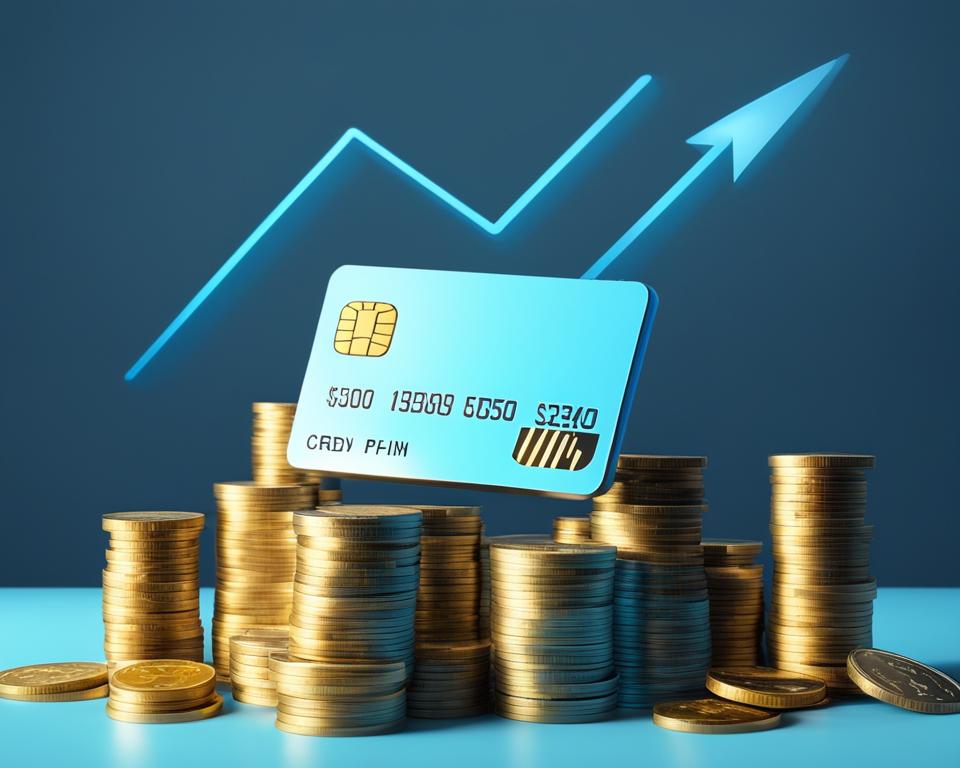Are you wondering how many credit cards you should have? Managing your credit cards effectively is crucial for maintaining a healthy credit score and reaping the benefits they offer. While there is no set number that applies to everyone, finding the optimal credit card count is essential for your financial well-being. Let’s explore the factors to consider when determining the right number of credit cards for you.
Key Takeaways:
- Having fewer than five credit accounts can make it difficult for scoring models to assess your creditworthiness.
- Having too many credit cards can lead to missed payments and lower credit scores.
- The number of credit cards you have affects your average credit age and utilization, which are important factors in credit scoring.
- It is generally recommended to have at least five credit accounts over time, including a mix of credit cards and loans.
- Owning multiple credit cards can offer advantages such as access to different rewards programs and a higher total credit limit.
The Impact of Credit Card Count on Credit Scores
Your credit card count plays a crucial role in determining your credit scores. One important factor to consider is your credit card utilization ratio, which measures the portion of your available credit that you are using. Keeping your credit card balances below 30% of your credit limits is key to optimizing your credit scores.
By maintaining a low credit card utilization ratio, you demonstrate responsible credit management and show lenders that you are not overly reliant on credit. This can positively impact your creditworthiness and increase your chances of obtaining favorable loan terms in the future.
Opening new credit card accounts can have a positive effect on your credit scores if used wisely. When you open a new credit card, it increases your overall credit limit. With a higher credit limit and responsible credit utilization, your credit card utilization ratio decreases, which can improve your credit scores.
However, it’s important to manage your credit responsibly and make timely payments. Opening too many credit card accounts without the ability to manage them can lead to missed payments, accumulated debt, and a lower credit score. It’s crucial to strike the right balance and only open new accounts when necessary or when they offer significant benefits that align with your financial goals.
Remember, maintaining a healthy credit profile goes beyond just your credit card count. It’s essential to create a solid foundation by making all your payments on time, reducing your overall debt, and managing your credit responsibly.
“Having the right number of credit cards can have a significant impact on your credit scores. It’s all about finding the right balance between credit utilization and responsible credit management.” – Financial Expert
Optimizing your credit card accounts requires a thorough understanding of your personal financial situation and goals. While there is no set number of credit cards that works for everyone, it’s advisable to keep the count manageable and aligned with your ability to manage credit responsibly.
The Relationship Between Credit Utilization Ratio and Credit Scores
A higher credit card utilization ratio can negatively impact your credit scores, while a lower ratio can have a positive effect. When your utilization ratio exceeds 30%, it suggests a higher level of credit risk as you are using a significant portion of your available credit. This can result in lower credit scores and potentially lower your chances of obtaining favorable loan terms.
On the other hand, maintaining a low credit card utilization ratio demonstrates responsible credit management and suggests that you are using credit conservatively. This can improve your creditworthiness and increase your credit scores.
Optimizing Your Credit Card Accounts
Optimizing your credit card accounts involves finding the best number of credit cards that works for you and utilizing them responsibly. Some key considerations include:
- Keeping your credit card balances below 30% of your credit limits to maintain a low credit card utilization ratio
- Opening new credit card accounts strategically to increase your overall credit limit and lower your credit card utilization ratio
- Managing your credit responsibly by making timely payments and avoiding excessive debt
By following these strategies, you can optimize your credit card count and maintain a healthy credit profile.
An image illustrating the impact of credit card utilization ratio on credit scores.
Guidelines for the Number of Credit Cards to Have
When it comes to the number of credit cards you should have, there is no one-size-fits-all answer. However, there are some guidelines to consider in order to optimize your credit card accounts and overall credit profile.
While having a few credit cards can be sufficient for some individuals, it is generally recommended to have at least five or more credit accounts over time. This may include a mix of credit cards and loans to diversify your credit portfolio.
One important reason to aim for more credit cards is to avoid having a thin credit file. Having only a few accounts on your credit report can make it harder to achieve a high credit score, as scoring models rely on a variety of factors to assess your creditworthiness.
Moreover, having additional credit cards can help keep your credit utilization ratio low. This ratio, which compares your credit card balances to your credit limits, is a significant factor in credit scoring. By spreading your purchases across multiple cards, you can maintain a lower utilization ratio and potentially boost your credit score.
However, it is essential to manage your credit cards effectively by making timely payments and avoiding excessive debts. Adding more credit cards to your wallet should not be an invitation to overspend, but rather an opportunity to optimize your credit profile.
Remember, the best number of credit cards for you depends on your financial goals and ability to manage them responsibly. By finding the right balance, you can maximize the benefits of credit cards while maintaining a healthy credit profile.
Summary:
- Having at least five or more credit accounts is generally recommended
- A thin credit file with only a few accounts can make it harder to achieve a high credit score
- More credit cards can help keep your credit utilization ratio low
- Managing and making timely payments is crucial when adding more credit cards
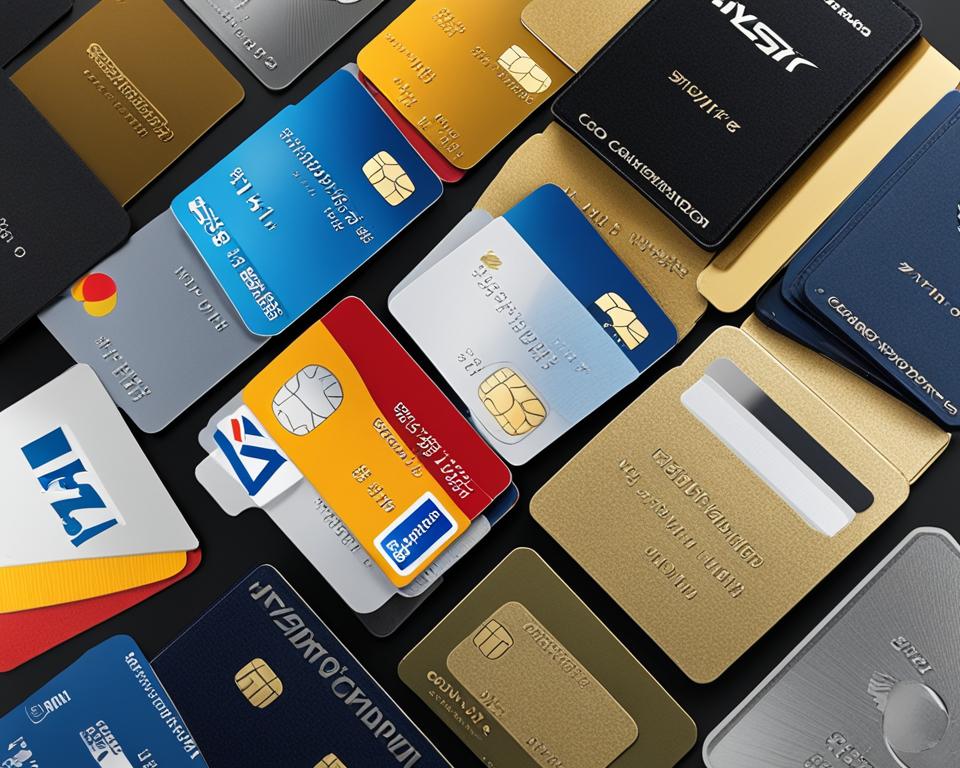
“Spreading your purchases across multiple cards can maintain a lower utilization ratio and potentially boost your credit score.”
Benefits of Having Multiple Credit Cards
Owning multiple credit cards can provide you with a range of benefits that can enhance your financial flexibility and maximize your credit card rewards. Whether it’s earning points, miles, or cash back, having multiple credit cards enables you to take advantage of different rewards programs and optimize your spending. Here are some key advantages of having multiple credit cards:
- Earning rewards: With multiple credit cards, you can earn rewards on a variety of purchases, such as groceries, dining, travel, or online shopping. Each card may offer different reward structures, allowing you to maximize the benefits based on your spending habits. For example, one card might offer higher cash back rates at supermarkets, while another may have generous travel rewards for flights and hotel stays.
- Backup options: Having multiple credit cards provides you with backup options in case one card is lost, stolen, or compromised. If one card becomes inactive or encounters issues, you can rely on your other cards to make necessary payments and continue using credit as usual. This can offer peace of mind and financial security.
- Higher credit limit: When you have multiple credit cards, your total credit limit increases. This higher credit limit can contribute to a lower credit utilization ratio, which is the percentage of credit you use compared to your total credit limit. Maintaining a low credit utilization ratio is beneficial for your credit scores. Having multiple credit cards can make it easier to keep your credit utilization ratio low, especially if you have responsible spending habits.
By strategically managing multiple credit cards, you can unlock the potential of various rewards programs and enhance your financial flexibility. Remember to utilize the rewards and perks offered by each card accordingly, keeping in mind any annual fees or other charges associated with the cards.
“Having multiple credit cards allows you to earn rewards on different types of spending and provides backup options in case of emergencies or issues with one card. It also offers a higher total credit limit, which can help maintain a low credit utilization ratio.”
Take a look at this table showcasing the potential benefits of having multiple credit cards:
| Benefits | Details |
|---|---|
| Earning Rewards | Multiple opportunities to earn points, miles, or cash back on different types of purchases. |
| Flexibility | Backup options in case one card is compromised or inactive. |
| Credit Utilization | Higher total credit limit, contributing to a lower credit utilization ratio. |
Having multiple credit cards can be a valuable financial strategy if you manage them responsibly and align them with your spending habits and financial goals. Keep in mind that responsible credit card usage entails making timely payments, keeping track of your spending, and staying within your means.
Potential Issues with Having Multiple Credit Cards
While there are benefits to having multiple credit cards, there are also potential challenges that individuals should be aware of. Managing multiple credit cards can become overwhelming, especially when it comes to keeping track of payment due dates and credit limits. It’s important to stay organized and develop strategies to effectively manage your cards.
“Managing multiple credit cards can become overwhelming, especially when it comes to keeping track of payment due dates and credit limits.”
One potential issue is the management of payment due dates. With multiple credit cards, it can be difficult to remember the due dates for each card. Missing a payment due date can result in late fees and negatively impact your credit score. To avoid this, it is recommended to automate monthly payments or align due dates with paydays. This ensures timely payments and reduces the likelihood of incurring unnecessary fees.
Another potential issue to consider is the impact of applying for multiple credit cards within a short period of time. Each credit card application triggers a hard inquiry on your credit report, which can temporarily lower your credit scores. This can be problematic if you are planning to apply for a major loan or mortgage in the near future. To minimize the impact, it is advisable to space out credit card applications and only apply for new cards when necessary.
- Manage payment due dates: Automate monthly payments or align due dates with paydays.
- Be cautious when applying for new cards: Space out credit card applications to minimize the impact on your credit scores.
It’s also important to be aware of the potential fees associated with having multiple credit cards. Different credit cards may have varying annual fees, balance transfer fees, or foreign transaction fees. It’s important to carefully review the terms and conditions of each card to understand the fees involved. Consider whether the rewards and benefits of each card outweigh the associated costs.
| Credit Card Fees | Annual Fee | Balance Transfer Fee | Foreign Transaction Fee |
|---|---|---|---|
| Card A | $95 | 3% | 2% |
| Card B | $0 | 5% | 0% |
| Card C | $150 | $10 or 3% | 1% |
Properly managing multiple credit cards requires organization and attention to detail. However, when managed effectively, multiple credit cards can provide opportunities to earn rewards and improve credit utilization ratios. By being mindful of payment due dates, understanding potential fees, and utilizing strategies to stay organized, individuals can navigate the potential issues associated with having multiple credit cards.
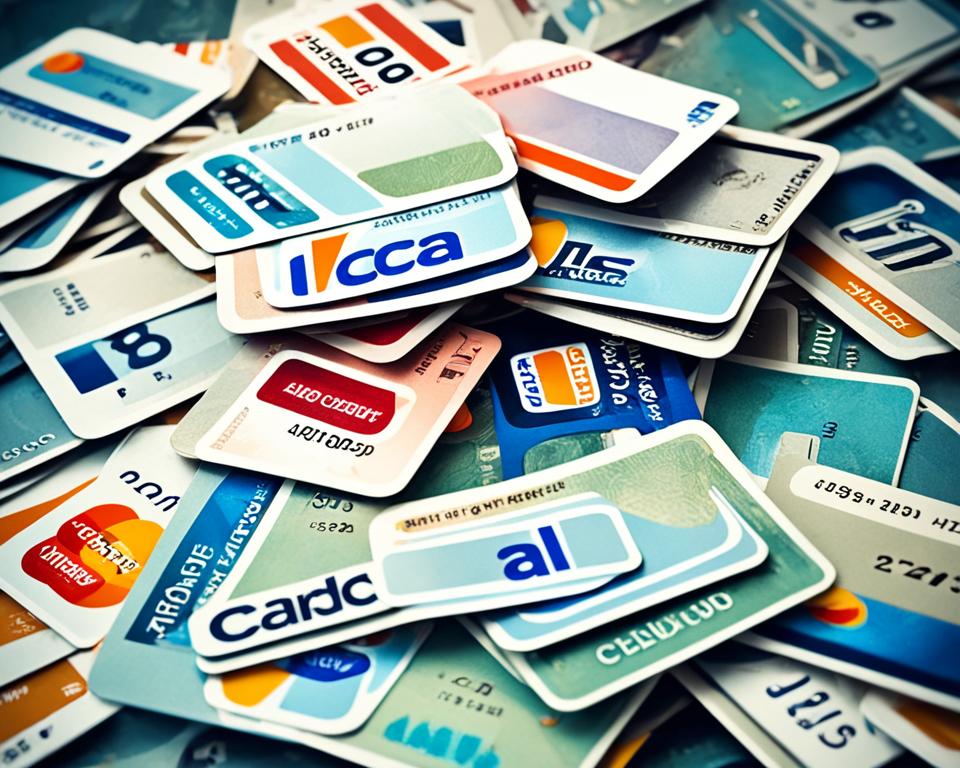
Determining the Right Number of Credit Cards for You
When it comes to credit cards, finding the optimal number that suits your personal financial situation and individual credit needs is key to managing your finances effectively. While the average American holds three credit cards, it’s important to consider factors such as your ability to manage and pay off credit card balances before deciding on the right credit card count for you.
Building good financial habits is an essential step in determining your optimal credit card count. Paying your bills on time, understanding money management principles, and meeting deadlines are crucial for maintaining a healthy financial foundation. By demonstrating responsible credit behavior and gaining experience, you can gradually increase your credit card count to align with your individual needs.
Remember that personal finance is just that—personal. What works for one person may not work for another. Evaluating your financial situation and spending habits will help you make an informed decision about the number of credit cards that is right for you.
Keep in mind that responsible credit card usage is paramount. It’s essential to borrow within your means, consistently make timely payments, and avoid accumulating excessive credit card debt. By finding the right balance of credit cards for your personal finance needs, you can optimize your financial management and creditworthiness.
Key Considerations for Determining Your Optimal Credit Card Count
- Spending habits: Assess your spending patterns and determine if having additional credit cards would provide value and convenience for your specific lifestyle.
- Personal financial management: Evaluate your ability to effectively manage multiple credit cards and pay bills in a timely manner.
- Rewards and benefits: Consider whether the benefits and rewards offered by additional credit cards align with your financial goals and spending preferences.
- Creditworthiness: Understand the potential impact on your credit score and credit utilization ratio by having a higher number of credit cards.
- Organizational skills: Reflect on your organizational capabilities and determine if you can manage multiple credit cards responsibly without missing payment due dates or exceeding credit limits.
“Finding the optimal number of credit cards requires careful consideration of your unique financial situation and credit needs. It’s important to strike a balance between convenience and responsibility to ensure that your credit card count aligns with your personal finance goals.” – Financial Expert
Impact of Multiple Credit Cards on Credit Scores
Having multiple credit cards can have a significant impact on your credit scores. While it may have positive effects, such as lowering your credit utilization ratio, it can also have negative consequences. Lenders may view a large number of open credit accounts as a potential risk, which can lower your credit scores.
To better understand the impact of multiple credit cards on your credit scores, it’s crucial to consider two important factors: credit utilization ratio and perceived risk.
The Role of Credit Utilization Ratio
Credit utilization ratio is the percentage of your total credit limit that you are currently using. It is a key factor in credit scoring models and affects about 30% of your credit scores. By having multiple credit cards, you can potentially lower your credit utilization ratio and improve your scores.
“Having multiple credit cards can increase your overall credit limit, which can help reduce your credit utilization ratio.”
For example, let’s say you have three credit cards, each with a $5,000 credit limit. If you only use $1,500 across all three cards, your credit utilization ratio would be 10% ($1,500/$15,000). This lower utilization ratio can demonstrate responsible credit management and positively impact your credit scores.
Perceived Risk of Having Multiple Credit Cards
On the other hand, having a large number of open credit accounts, even if they are actively managed, can be viewed as a potential risk by lenders. They may interpret it as an increased likelihood of accumulating excessive debt or having difficulty making payments.
“Lenders may consider individuals with a high number of open credit accounts as higher-risk borrowers.”
While this perception may vary among lenders, it’s essential to be aware of the potential impact on your credit scores when deciding to open multiple credit cards.
Regularly monitoring your credit reports is essential to ensure your credit card usage is not negatively affecting your credit scores. By staying informed, you can make adjustments or take necessary steps to maintain a healthy credit score.
In summary, having multiple credit cards can impact your credit scores both positively and negatively. It’s important to maintain a balance and be mindful of your credit utilization ratio. While multiple credit cards can potentially help improve your scores, they can also be perceived as a risk by lenders. Regularly monitoring your credit reports and managing your credit responsibly are crucial for maintaining a healthy credit score.
Considerations for Applying for New Credit Cards
When it comes to applying for new credit cards, it’s crucial to understand the potential impact on your credit scores. Each credit card application results in a hard inquiry, which can temporarily lower your scores. To minimize this impact and ensure responsible credit behavior, there are a few key considerations to keep in mind.
Space Out Credit Card Applications
Spacing out your credit card applications is essential for protecting your credit scores. Applying for multiple cards within a short period of time can raise red flags and make you appear financially stretched. It’s best to apply for new cards only when necessary and avoid a flurry of applications.
By spacing out your credit card applications, each hard inquiry will have less of an effect on your credit scores. This allows you to maintain a positive credit profile while still taking advantage of new credit card offers.
Understand Your Current Credit Score
Before applying for a new credit card, it’s important to have a good understanding of your current credit score. This will help you assess whether you’re likely to be approved for the card you’re applying for. It’s also essential to know where your credit score stands to avoid unnecessary hard inquiries that could potentially harm your scores.
Monitoring your credit score regularly can provide valuable insights into your creditworthiness and help you make informed decisions when applying for new credit.
Consider Your Ability to Manage Additional Credit
Before applying for a new credit card, take a moment to assess your ability to manage additional credit. Consider your current financial responsibilities, debt load, and monthly budget. Adding a new credit card to the mix should not stretch your finances or make it difficult to meet your existing financial obligations.
Take into account the potential credit limit, annual fees, and interest rates associated with the new credit card. Ensure that you have a clear plan and budget in place to manage the new credit responsibly.
Evaluate the Terms and Benefits of the New Credit Card
Lastly, thoroughly evaluate the terms and benefits of the new credit card you’re considering. Each credit card offers different perks, rewards, and interest rates. Take the time to compare various options and choose a card that aligns with your spending habits and financial goals.
Understanding the terms and benefits of the new credit card will ensure that it’s a good fit for your financial needs and that you can take full advantage of its features.
Downsides of Having Too Many Credit Cards
While there are benefits to having multiple credit cards, it’s important to consider the downsides as well. Managing multiple credit cards can become challenging, leading to potential problems with credit card debt and fees.
The Risk of Missed Payments and Accumulating Credit Card Debt
Managing multiple credit cards increases the complexity of keeping track of payment due dates and balances, which can increase the risk of missed payments. Missed payments can have a negative impact on your credit score and lead to additional fees and interest charges. If you’re juggling multiple due dates, it’s easier to overlook one and fall behind on payments. This can ultimately result in a cycle of accumulating credit card debt.
Multiple Fees and Interest Charges
Holding multiple credit cards means multiple annual fees, late payment fees, and potentially higher interest charges. Each credit card comes with its own set of fees, and if you’re not diligent about monitoring and managing them, they can add up quickly. Additionally, carrying balances on multiple credit cards means paying interest on each of them, which can become costly over time.
Assess Your Financial Situation before Acquiring More Credit Cards
Before acquiring additional credit cards, it’s crucial to assess your financial situation and your ability to manage multiple cards effectively. Consider factors such as your income, expenses, and existing credit card balances. Ask yourself if you have the means to handle the financial responsibilities and diligently make payments on time. It’s essential to be realistic about your financial capabilities and avoid taking on more credit than you can comfortably manage.

| Downsides of Having Too Many Credit Cards | Solutions and Recommendations |
|---|---|
| Increased risk of missed payments | Use payment reminders or set up automatic payments to avoid missed payments and late fees. |
| Accumulation of credit card debt | Create a budget, pay off high-interest debt first, and consider a debt repayment strategy such as the snowball or avalanche method. |
| Multiple fees and interest charges | Review and compare credit card terms and fees before applying, and consider cards with low or no annual fees. |
| Difficulty in managing multiple cards | Keep track of payment due dates and balances using budgeting tools or smartphone apps. Consider reducing the number of credit cards to a manageable amount. |
Tips for Managing Multiple Credit Cards
Managing multiple credit cards effectively is crucial for optimizing their benefits while avoiding potential pitfalls. Organizing your finances and staying on top of payment due dates and credit limits are essential practices. Here are some valuable tips to help you manage multiple credit cards:
- Keep track of payment due dates: Missing payment due dates can result in late fees and damage to your credit score. Utilize calendar reminders or set up automatic payments to ensure timely payments on all your credit cards.
- Monitor credit limits: It’s important to know the credit limits on all your credit cards to avoid exceeding them. Regularly checking your credit limits can help you manage your spending and maintain a healthy credit utilization ratio.
- Automate monthly payments: Consider setting up automatic monthly payments for your credit card bills. This can help you avoid missing payments and ensure that you are consistently meeting your financial obligations.
- Align due dates with paydays: If possible, request a change in due dates for your credit cards to align them with your paydays. This can make it easier to manage your cash flow and ensure that you have funds available to make timely payments.
- Utilize credit score dashboards: Many credit card issuers provide credit score monitoring services or dashboards. Take advantage of these tools to track your credit utilization, monitor changes in your credit score, and stay informed about your overall credit health.
- Choose cards based on rewards and perks: Carefully consider the rewards and perks offered by different credit cards. Look for cards that align with your spending habits and financial goals, whether it’s earning cash back, travel rewards, or other benefits that suit your lifestyle.
Remember, effectively managing multiple credit cards requires discipline, organization, and responsible financial habits. Stay proactive and keep an eye on your credit card accounts to maintain control of your finances and maximize the benefits of your cards.
Additional Considerations
In addition to the tips above, it’s essential to regularly review your credit card statements, check for any unauthorized charges, and report any suspicious activity to the card issuer immediately. It’s also advisable to periodically reassess your credit card needs and consider closing inactive accounts to streamline your credit card management.
By effectively managing multiple credit cards, you can confidently navigate your finances, meet payment obligations, and make the most of the benefits offered by your credit cards.
The Role of Credit Cards in Emergencies
In times of emergencies when cash may not be readily available, credit cards can serve as a valuable backup payment method. They provide flexibility and financial security, allowing individuals to manage unexpected expenses effectively.
Having at least two or three credit cards can be advantageous in such situations, as it provides options and a safety net. Different credit cards may have varying credit limits, rewards programs, and benefits, which can help individuals tailor their financial approach to the specific emergency at hand.
However, it’s crucial to use credit cards responsibly during emergencies. It’s important to avoid taking on unmanageable amounts of debt and accumulating high-interest charges. While credit cards can help cover immediate expenses, creating an emergency savings fund in a liquid account, such as a savings account, should still be the primary focus for long-term financial preparedness.
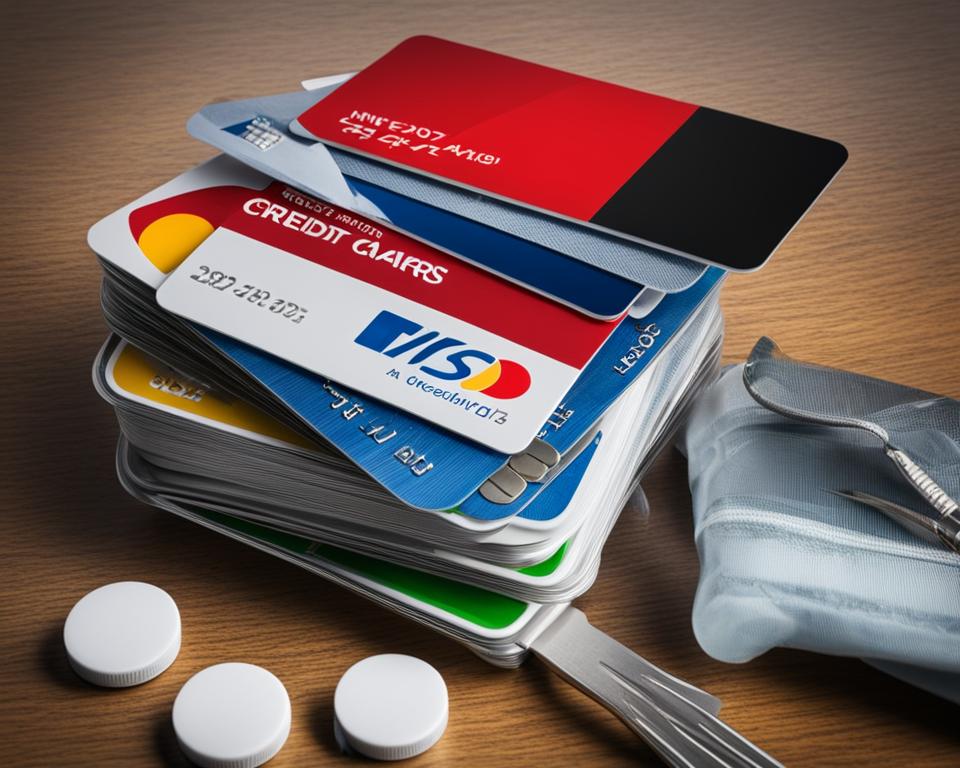
Finding the Right Balance
The right number of credit cards ultimately depends on individual financial circumstances and goals. It’s important to find a balance between maximizing credit card benefits and maintaining responsible credit card usage. Regularly assess your credit card usage, keep track of payments, and avoid unnecessary credit card applications. By managing credit cards wisely and maintaining good financial habits, you can optimize your credit card count and achieve a healthy balance in your financial life.
The Importance of Maintaining Financial Balance
Maintaining financial balance is crucial for long-term financial success. It involves managing your income, expenses, and debt levels in a way that allows you to meet your financial goals while maintaining a healthy financial position. This includes responsible credit card usage, as credit cards can either be a helpful tool or a potential source of financial stress.
Table: Pros and Cons of Maintaining a Balance
| Pros | Cons |
|---|---|
| Maximizing credit card benefits | Potential for overspending |
| Building a positive credit history | Accumulating unnecessary debt |
| Earning rewards and cashback | Paying high interest rates |
| Improving credit utilization and scores | Damaged credit history due to missed payments |
Quotes:
“Maintaining financial balance through responsible credit card usage is crucial for not only maximizing the benefits of credit cards but also avoiding potential financial pitfalls.” – [Financial Expert]
Tips for Responsible Credit Card Usage
To maintain a healthy balance, follow these tips:
- Pay your credit card bills on time and in full to avoid interest charges and late fees.
- Keep track of your credit card spending and stay within your budget.
- Regularly review your credit card statements for any errors or unauthorized transactions.
- Avoid carrying a high balance on your credit cards to keep your credit utilization ratio low.
- Monitor your credit scores regularly to ensure they aren’t negatively impacted by credit card usage.
Conclusion
The optimal number of credit cards for each individual will vary based on their unique financial situation and goals. When considering the credit card count, it’s important to take into account factors such as credit utilization, payment history, and personal financial management skills.
While there is no one-size-fits-all answer, finding the optimal number of credit cards is crucial to maximize the benefits of credit cards while maintaining a healthy credit profile. It’s essential to evaluate your ability to manage credit responsibly, making informed decisions when applying for new credit cards.
By carefully assessing your financial capabilities and considering your spending habits, you can determine how many credit cards will best suit your needs. Remember to maintain good credit habits, such as making timely payments and keeping your credit utilization low.
Ultimately, finding the right balance in your credit card count will allow you to leverage the benefits of credit cards while managing your finances effectively, leading to a healthier credit profile and increased financial stability.
FAQ
How many credit cards should I have?
While there is no set number, it is generally recommended to have at least five or more credit accounts over time to maintain a healthy credit score and maximize benefits.
How does the number of credit cards affect my credit scores?
The number of credit cards you have impacts your credit utilization ratio and average credit age, both of which are important factors in credit scoring.
What are the guidelines for the number of credit cards to have?
There is no magic number, but having a mix of credit cards and loans and maintaining responsible credit behavior is key to optimizing your credit card count.
What are the benefits of having multiple credit cards?
Multiple credit cards allow you to take advantage of different rewards programs, provide backup options, and increase your total credit limit, which can improve your credit utilization ratio and scores.
What potential issues should I consider with having multiple credit cards?
Managing multiple credit cards can be overwhelming and result in missed payments or accumulating debt. Multiple cards also mean multiple fees and interest charges to manage.
How do I determine the right number of credit cards for me?
The optimal number of credit cards depends on your individual financial situation and ability to manage credit responsibly. It is important to find a balance that aligns with your needs and goals.
How does having multiple credit cards impact my credit scores?
Having multiple credit cards can have both positive and negative effects on your credit scores. It can lower your credit utilization ratio but can also be seen as a risk by lenders.
What should I consider when applying for new credit cards?
Applying for new credit cards can result in temporary score decreases due to hard inquiries. It is important to space out applications and consider your current credit score and ability to manage additional credit.
What are the downsides of having too many credit cards?
Having too many credit cards can make managing payments and balances difficult, increase the risk of missed payments and accumulating debt, and result in multiple fees and interest charges.
What tips can help me manage multiple credit cards effectively?
To manage multiple credit cards effectively, stay organized by keeping track of payment due dates and credit limits, automate monthly payments, and utilize credit score dashboards to monitor credit utilization and spending.
How do credit cards play a role in emergencies?
Credit cards can serve as a valuable backup payment method in emergencies. However, it is still essential to have emergency savings in a liquid account as the primary focus for financial preparedness.
How can I find the right balance with credit cards?
Determining the right balance involves maintaining responsible credit card usage, assessing your financial situation, and ensuring you can manage credit cards effectively while meeting your financial goals.
What is the optimal number of credit cards?
The optimal number of credit cards varies for each individual based on their unique financial circumstances and goals. It is important to find a balance that maximizes benefits while maintaining responsible credit behavior.

